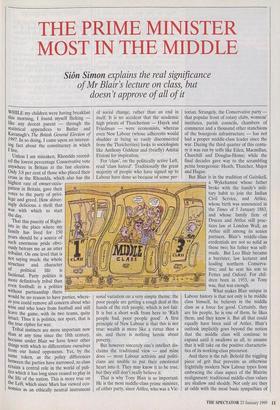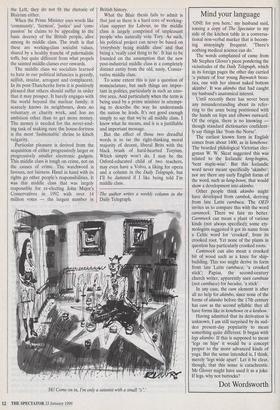THE PRIME MINISTER MOST IN THE MIDDLE
Sion Simon explains the real significance
of Mr Blair's lecture on class, but doesn't approve of all of it
WHILE my children were having breakfast this morning, I found myself flicking like any decent parent — through the statistical appendices to Butler and Kavanagh's The British General Election of 1997 In so doing, I came upon an interest- ing fact about the constituency in which I live.
Unless I am mistaken, Rhondda record- ed the lowest percentage Conservative vote anywhere in Britain at the last election. Only 3.8 per cent of those who placed their cross in the Rhondda, which also has the highest rate of owner-occu- pation in Britain, gave their votes to the party of privi- lege and greed. How shiver- mgly delicious a thrill that was with which to start the day.
That this paucity of Right- ists in the place where my family has lived for 150 Years should be a source of such enormous pride obvi- ously betrays me as an utter tnbalist. On one level that is not saying much: the whole structure and character of political life is factional. Party politics is more definitively tribal than even football: in a politics without partisanship there would be no reason to have parties, where- as you could remove all concern about who wills and who loses from football and still leave the game, with its two teams, quite intact. Thus it is politics, not sport, that is the true cipher for war. Tribal instincts are more important now than at any time since the 18th century, because under Blair we have fewer other things with which to differentiate ourselves from our hated opponents. Yet, by the same token, as the policy differences between the parties have narrowed, so class retains a central role in the world of poli- tics which it has long since ceased to play in the life of the nation. This is more true on the Left, which since Marx has viewed eco- nomics as an ethically neutral instrument of social change, rather than an end in itself. It is no accident that the academic high priests of Thatcherism — Hayek and Friedman — were economists, whereas even New Labour (whose adherents would shudder at being so easily disconnected from the Thatcherites) looks to sociologists like Anthony Giddens and (briefly) Amitai Etzioni for inspiration.
For 'class', on the politically active Left, read 'class hatred'. Traditionally the great majority of people who have signed up to Labour have done so because of some per- sonal variation on a very simple theme: the poor people are getting a rough deal at the hands of the rich people, which is not fair. It is but a short walk from here to 'Rich people bad, poor people good'. A first principle of New Labour is that this is not true: wealth is more like a virtue than a sin, and there is nothing heroic about poverty.
But however sincerely one's intellect dis- claims the traditional view — and mine does — most Labour activists and politi- cians are unable to put their emotional heart into it. They may know it to be true, but they still don't really believe it.
That is why Tony Blair is so important. He is the most middle-class prime minister, of either party, since Attlee, who was a Vic- torian. Strangely, the Conservative party that popular front of rotary clubs, womens' institutes, parish councils, chambers of commerce and a thousand other stanchions of the bourgeois infrastructure — has not had a proper middle-class leader since the war. During the third quarter of this centu- ry it was run by toffs like Eden, Macmillan, Churchill and Douglas-Home; while the final decades gave way to the scrambling petite bourgeoisie: Heath, Thatcher, Major and Hague.
But Blair is in the tradition of Gaitskell, a Wykehamist whose father broke with the family's mili- tary habit to join the Indian Civil Service, and Attlee, whose birth was announced in the Times of 5 January 1883, and whose family firm of Druces and Attlee still prac- tices law at London Wall, an Attlee still among its senior partners. Blair's middle-class credentials are not so solid as these two; his father was self- made. But Leo Blair became a barrister, law lecturer and leading northern Conserva- tive; and he sent his son to Fettes and Oxford. For chil- dren born in 1953, as Tony was, that was enough.
What makes Blair unique in Labour history is that not only is he middle class himself, he believes in the middle class as a force for good. Certainly, they are his people, he is one of them, he likes them, and they know it. But all that could equally have been said of Attlee. Blair's outlook implicitly goes beyond the notion that the middle class will continue to expand until it swallows us all, to assume that it will take on the positive characteris- tics of its working-class precursor.
And there is the rub. Behold the niggling piece of grit that prevents us otherwise frightfully modern New Labour types from embracing the class aspect of the Blairite realignment: traditional middle-class values are shallow and shoddy. Not only are they at odds with the most basic sympathies of the Left, they do not fit the rhetoric of Blairism either.
When the Prime Minister uses words like `community', 'fairness', 'justice' and 'com- passion' he claims to be appealing to the basic decency of the British people, alive among its middle class. The truth is that these are working-class socialist values, shared by a healthy tranche of paternalistic toffs, but quite different from what propels the sainted middle-classes ever onwards.
The middle class we socialists learned to hate in our political infancies is greedy, selfish, insular, arrogant and complacent. In its post-Thatcherite form it is positively pleased that others should suffer in order that it may prosper. It barely engages with the world beyond the nuclear family: it scarcely knows its neighbours, does no voluntary or charity work, and has no ambition other than to get more money. The money is needed for the never-end- ing task of making sure the house-fortress is the most 'fashionable' shrine to kitsch vulgarity.
Particular pleasure is derived from the acquisition of either progressively larger or progressively smaller electronic gadgets. This middle class is tough on crime, not on the causes of crime. The watchword is favours, not fairness. Hand in hand with its rights go other people's responsibilities. It was this middle class that was largely responsible for re-electing John Major's Conservatives in 1992 with over 14 million votes — the largest number in British history.
What the Blair thesis fails to admit is that just as there is a hard core of working- class support for Labour, so the middle class is largely comprised of unpleasant people who naturally vote Tory. As such, his political project can never be based on `everybody being middle class' and that being a 'really cool thing to be'. It has to be founded on the assumption that the new post-industrial middle class is a completely distinct entity from the old, nasty, Conser- vative middle class.
To some extent this is just a question of nomenclature, but such things are impor- tant in politics, particularly in such an emo- tive area. And particularly when the term is being used by a prime minister in attempt- ing to describe the way he understands the nation he leads. It's not good enough simply to say that we're all middle class. I know what he means, and it is a justifiable and important message.
But the effect of those two dreadful words is to tar the right-thinking moral majority of decent, liberal Brits with the black brush of hard-hearted Toryism. Which simply won't do. I may be the Oxford-educated child of two teachers, may even have a Volvo, a liking for opera and a column in the Daily Telegraph, but I'll be damned if I like being told I'm middle class.
The author writes a weekly column in the Daily Telegraph.
'HP Come on in, I'm only a satanist with a small "s".'



























































 Previous page
Previous page